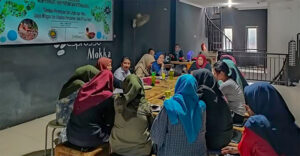
Deliberation of Job Creation draft bill into law has still sparked public objection and rally nearly across from Indonesia. Civil Society Coalition for Sustainable Fisheries and Maritime (KORAL) addressed the rejection against the law that helps ease business licensing.
With its press release on 6 October 2020, KORAL strongly articulated its opposition due to the fact that the Job Creation Law does not go in line with good decision-making governance principles. Worse still, the substance might threaten the sustainability of Indonesian maritime resources.
The formation of regulation here is conducted at a fast pace with minimum public participation from the arrangement to the discussion processes. Whereas, the law legalizes various aspects which will influence the lives of Indonesian citizens. Public participation should have been regarded a crucial element to assure the drafting does not simply favor a certain group but the whole interests of the nations.
Read also: Environment and Indigenous Peoples in the Job Creation Law
The abandon of principles in drafting Job Creation bill has brought about various problems from many sectors including fisheries and maritime. Responding to the deliberation of Job Creation draft bill on 5 October 2020 by the House of Representatives, KORAL addressed seven crucial points with adverse impact to fisheries and maritime potentials.
First, centralization of authority to the central government could diminish control over exploitation of fisheries and maritime resources and weaken the essence of regional autonomy.
KORAL considers the Job Creation Law does not provide any certainty to who or what institution at the central government that will lead the authority. The centralized licensing authority transfer to the central government could diminish control over that could have prevented overexploitation. Centralized licensing authority will worsen the access of regional businesspeople who formerly could get licensing at their region. Without the backup of good governance, the centralized authority could potentially lead to an abuse of power in fisheries and maritime management.
Second, licensing is simplified in favor of major investor and businesspeople.
Licensing simplified by the Job Creation Law could lure massive business expansion on the coastal areas and ocean spatial regardless the existing ecosystem. The government has so far assigned 13 Special Economic Zone (KEK) to ease investment. When aligned to the Job Creation Law, degradation of coastal ecosystem such as mangrove, seagrass and coral reef will really threaten the fishermen livelihood.
Business licensing is only compulsory to a certain business type which is considered having high impact. In fact, the accuracy of criteria of high impact business remains questionable. The amendment of environmental permit into environmental approval is potentially to reduce the essence of monitoring, controlling and prevention.
Third, there is indication that foreign vessel operation for fishing at Indonesian ZEE will be opened following the Job Creation Law.
The deliberation of Job Creation draft bill sustains the stipulation on foreign vessels as mandated by the Fisheries Law, but it eliminates the stipulation of compulsory employment of 70 percent of Indonesian crews of each vessel. Whereas, the fisheries resources in Indonesia should have been intended to the welfare of Indonesian people as mandated by the 1945 Constitution’s Article 33 (3).
Fourth, change of licensing system is risk-based approach but lacking clear and credible methodology and institution.
Indonesia currently has no institution yet with readiness and qualification to define risk holistically. Let alone, the database in Indonesia cannot support the effectiveness of risk-based approach yet and thus risk mitigation might be subjective. As a result, business activity which is not considered high risk will not be obliged to attain license. Without accurate risk mitigation, it will jeopardize the sustainability of Indonesian fisheries and maritime resources.
Fifth, elimination of National Commission on Fish Stock Assessment (Komnas KAJISKAN) will reduce scientific roles in decision-making process.
KAJISKAN Commission is deemed an independent institution that is authorized to have a scientific assessment of fish potentials in Indonesia. With the absence of the commission, potential assessment could be intervened by political interest and the assessment will not give credible results. Consequently, fishing management and overfishing will be out of control. Currently, the government’s Maritime and Fisheries Minister Regulation (Kepmen-KP) No. 50/2017 declares that most of major fisheries in Indonesia has been overfishiing.
Sixth, the amendment of definition of small fisherman without restricting weight of vessel could reduce affirmative action essence to small fisherman.
With such an unclear definition, the fishermen that are currently categorized as small fishermen could take an advantage that should have benefited small fishermen in the future. For instance, subsidy to small fishermen and fishing areas nearby coastal area. Meanwhile, the elimination of vessel weight as the indicator of small fisherman definition will potentially spark unfair competition.
Seventh, Job Creation Law minimizes public participation in the policymaking of coastal utilization.
Public engagement during the drafting of Environmental Impact Analysis (AMDAL) is restricted and AMDAL Assessment Commission involving multi-stakeholder is eliminated. It implies that the utilization of coastal area management is potentially to pay no attention to the community relying their livelihood on coastal ecosystem preservation.
The aforementioned seven points indicate that the enactment of Job Creation Law will unlock opportunities to overexploitation of maritime resources and thus small and traditional fishermen will suffer from economic losses and marginalization. So to speak, the coastal communities will be severely impacted by the regulation. Worse still, the regulation will speed up the degradation of coastal ecosystem and maritime resources. As to Wiro Wirandi, EcoNusa Foundation’s Ocean Program Manager, coastal community will be impacted by the regulation as their livelihood relies much on the preservation of maritime resources to meet their daily needs.
Read also: Sustainable Fisheries and Maritime Less Prioritized in Job Creation Bill
“Coastal community, particularly the small and traditional fishermen, are coping with hardship due to overfishing and degraded ocean habitat. The deliberation of Job Creation draft bill that neglects environmental protection and small fishermen welfare will surely burden their lives. As a result, small fishermen will go downwards into poverty,” said Wiro in response to the deliberation of Job Creation draft bill related to maritime and fisheries issue.
Civil Society Coalition for Sustainable Fisheries and Maritime (KORAL) consisting of: IOJI (Indonesia Ocean Justice Initiative), Pandu Laut Nusantara, EcoNusa, KIARA, WALHI, Greenpeace Indonesia, ICEL (Indonesian Center of for Environmental Law), Destructive Fishing Watch (DFW), Yayasan Terangi.
Reviewer: Wiro Wirandi, EcoNusa’s Ocean Program Manager EcoNusa
Editor: Leo Wahyudi S







